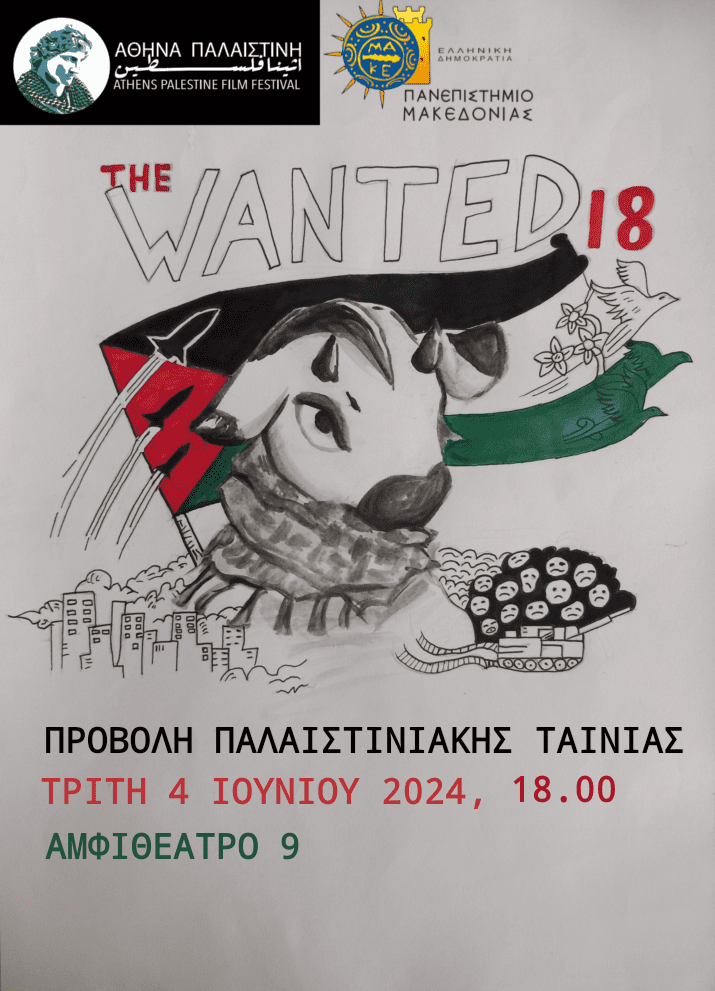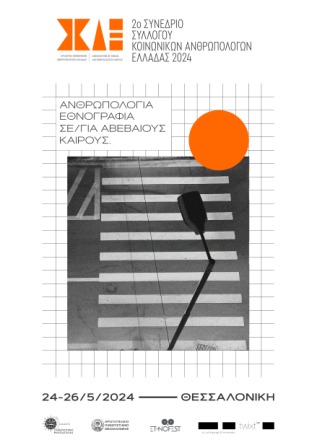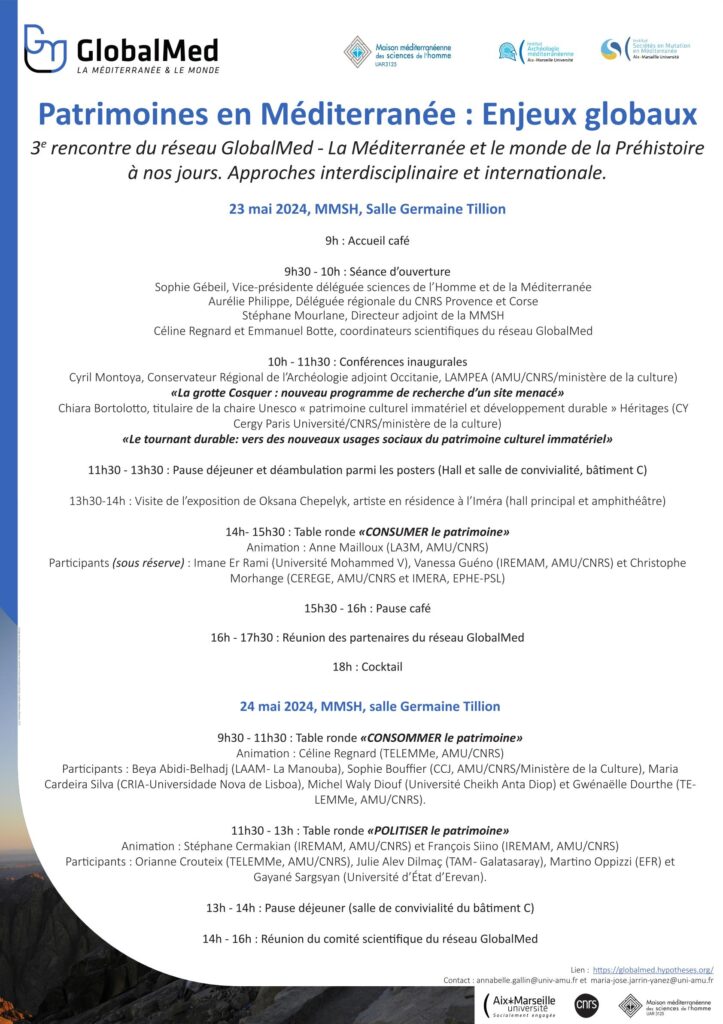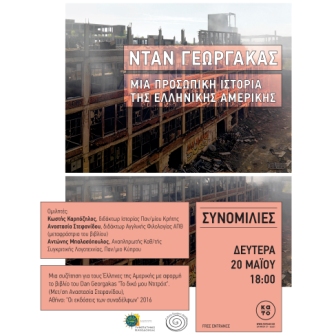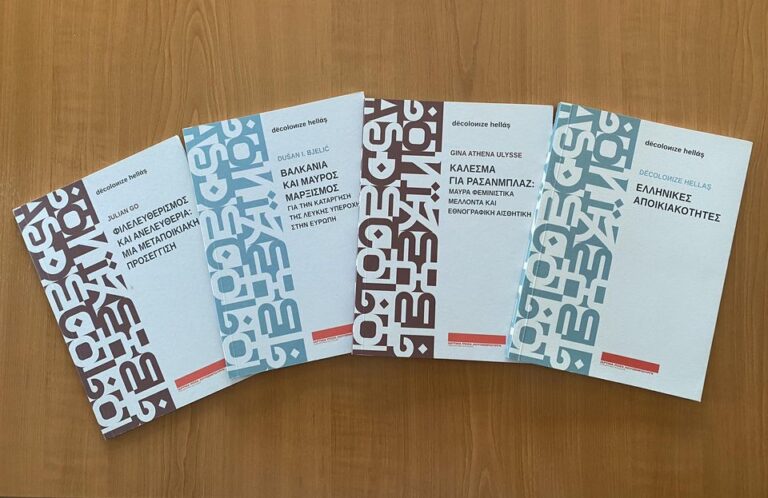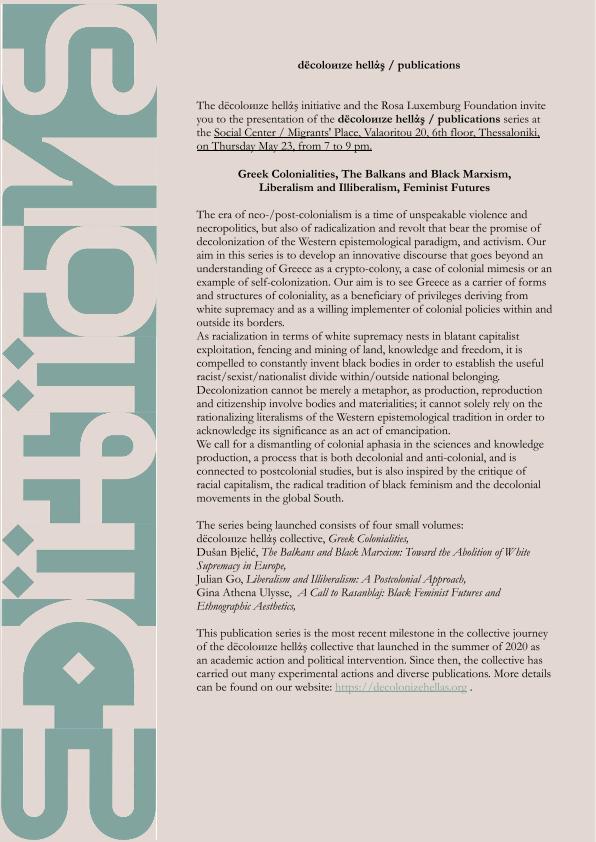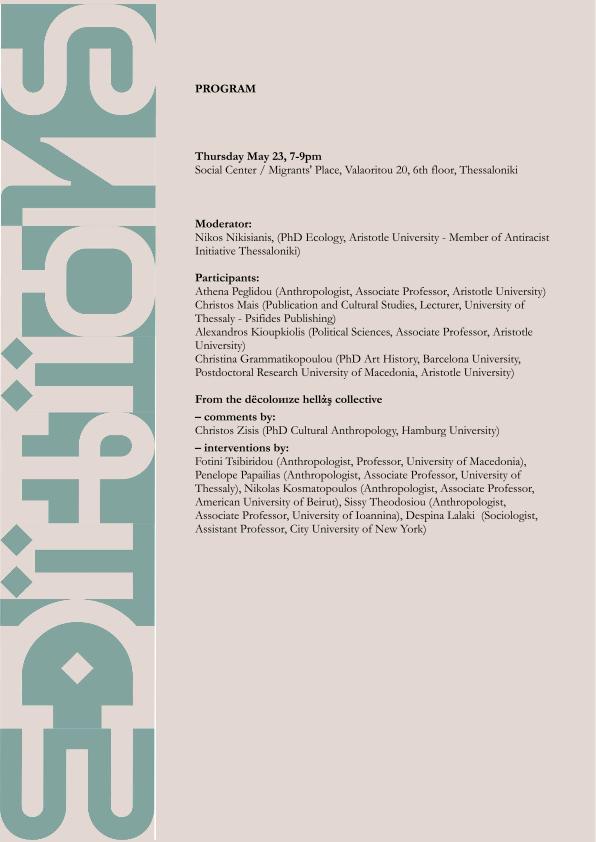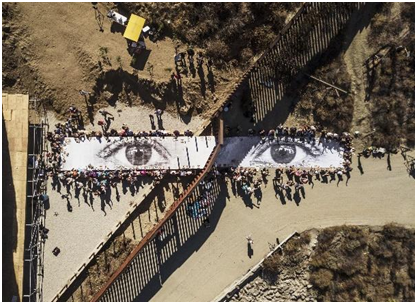F. Tsibiridou (ed.)
Since 2022, at the Culture-Borders-Gender/Lab under the direction of F. Tsibiridou, a research team was formed, including: Areti Kondylidou, social anthropologist/theatrical, Ministry of Culture; Christina Gromballi, MA student, Department of Balkan, Slavic, and Oriental Studies, University of Macedonia; Georgia Rina, postdoctoral researcher, Department of Balkan, Slavic, and Oriental Studies, University of Macedonia; Nikos Manolas, PhD candidate in Anthropology, Department of Balkan, Slavic, and Oriental Studies, University of Macedonia; Themis Valasiadis, PhD candidate in History, Department of Balkan, Slavic, and Oriental Studies, University of Macedonia; Dimitris Kataiftsis, adjunct lecturer, Department of Balkan, Slavic, and Oriental Studies, University of Macedonia; Anastasia Mitropanou, PhD candidate in Anthropology, Department of Balkan, Slavic, and Oriental Studies, University of Macedonia; and Eftychia Karyda, MA student, Department of Balkan, Slavic, and Oriental Studies, University of Macedonia. Visual and acoustic supervision was provided by Loukas Efstratiou (undergraduate student, UoA) and Christina Grammatikopoulou (research and teaching fellow, University of Macedonia).
The research team initiated a non-funded research program of Public Anthropology in the city of Thessaloniki, aimed at teaching and research in the field, both within and outside the walls of the academic community. Anti-tours were organized based on ethnographic and archival research, collaboration within the context of the workshop, and the use of decolonial methodologies at a neighborhood scale.
The ‘neighborhood’, as a subset of urban space, has been a significant category of sociological analysis of migration and refuge since the early 20th century. In 1925, the classic work of Park and Burgess (The City. Chicago: University of Chicago Press, 2019), founders of the Chicago School, connected African-Americans and Hispanic migrants in Northern American cities with the creation of so-called ‘ethnic neighborhoods’. This perception also associated refugee neighborhoods with resistance to assimilation and integration policies, often conflating ethnic neighborhoods with ghettos. With the end of European colonialism, when Anthropology returned home, particularly in the Mediterranean environment of Europe, and cautiously included the study of urban space, it focused on neighborhoods, highlighting, despite the oxymoron of intentions, the place as a signifier of socialization and the formation of gendered self, citizenship, and management of individual and collective memory. This participatory field observation methodologically contributed to the multifaceted and dynamic dimension of the neighborhood for knowledge and policy production.
In Greece, the 1922 refugee crisis exacerbated ethnic divisions within the national model, not only due to linguistic or religious differences, as seen distinctly in Thessaloniki between Jews and refugees, but also due to class and regional conditions. Following the ‘Asia Minor catastrophe’ of 1922 and the forced population exchange based on the Treaty of Lausanne (1923), refugees settled broadly in the northern Greek countryside, Athens, Piraeus, and urban environments within and outside the walls of Thessaloniki, significantly influencing the country’s economic, social, and political life. The first ethnographic research on the “Heirs of the Asia Minor Catastrophe” was conducted in Kokkinia, a ‘refugee neighborhood’ in Piraeus, by anthropologist Renée Hirschon in the 1970s (Heirs of the Catastrophe: The Social Life of Asia Minor Refugees in Piraeus. MIET, Athens, 2004).
In Thessaloniki, our relationship with the Others/foreigners/disenfranchised has historically passed through interpersonal short stories, daily small things, materialities, wounds and pleasures, memories, and experiences that were not of interest to the grand narratives of national memory, and were not reflected in our city’s national historical and archaeological museums. Within the framework of the seminar and other activities of Public Anthropology by the Culture-Borders-Gender/Lab, the first Anti-Tour workshop took place and was visually and acoustically recorded in September 2023.
Anti-Tour: Pilgrimage to the neighborhoods of the absent… https://youtu.be/xggSkMYXglI
Since then, different occasions within the project have facilitated consecutive presentations, reflections, and feedback from diverse audiences. With the goal of this serving as a methodological example for further anti-tour workshops in the neighborhoods of the city, we explore how pilgrimage routes function as a decolonial anti-tour methodology in Ano Poli and the possibilities for other counter-categories to serve as concepts/keys for additional areas. Focusing on performance, materialities, and subaltern bodies, we not only give visibility and voice to those who otherwise cannot speak but also highlight the potential for restoring narratives that do not reflect national dominance, and reversing/restoring wisdom and prudence from below, through everyday practices that address the past as the history of the present and anticipate the significance of lived experiences in a more inclusive future.
Specifically, within the framework of a Summer School in collaboration with foreign universities and the French School of Athens on “Religion and Politics: Between res publica and private practices” (September 2023), participation as a collaboration of the Culture-Borders-Gender/Lab (BSOS-PAMAK) included, among other activities, an anti-tour workshop inside and outside the Eastern Walls of the city.
In the anti-tour workshop, a group of researchers from the perspective of Anthropology, while attempting to open decolonial methodologies of research, narrative, writing, and interaction with/in the neighborhoods of the city, also brought to light a reflexive view of anti-tour as a form of collaboration within the group.
The anti-tour workshop that started from the neighborhoods of Ano Poli and culminated at the Jewish monument of the Aristotle University of Thessaloniki, bore the characteristics of a pilgrim procession in the neighborhoods of the excluded, the absent, and the forgotten from the dominant national narratives of the sovereign Greek state in the northern Greek public space since 1912. We followed the modality of the Epitaph that even today wanders around these neighbourhoods, including stops, narrations and performative testimonies in churches, mausoleums, baths, cemeteries, peculiar and marginal buildings. These sacred places that had been driven to collective oblivion were brought into visibility/life through narratives and performances about charismatic saints and dervishes, everyday women and subaltern bodies, blessed materialities, and other beings, from the world of the dead and the uncanny, inside/outside the walls. Employing decolonial methodologies that trace materialities, humble bodies and popular imagination on occasion, we attempted to subvert linear chronological narratives in the history of the city. As we explored religiosity beyond the boundaries of orthopraxy (intrareligious testimonies), we insisted on the co-articulation of materialities and subaltern bodies.
We joined the palimpsest of spatio-representative narratives in different spatio-temporal contexts through performative practices that highlighted aspects of pilgrimage at the pilgrimage sites/monuments. Utilizing a multi-sensory approach, we tried to produce knowledge through different experiences of corporeality and performances such as dramaturgical recitations, soundscapes, tactilities, and smells that recalled “what has been,” and tastes that gained new meaning in past occasions and spaces. Through this collage (assemblage/rasanblaj) of narrative practices, performed ritually, we sought not only a counter-narrative of the history of the city’s neighborhoods but also, by conversing with other creatures and worlds, we tried to fortuitously bring back enchantment to the everyday life of the neighborhood.

